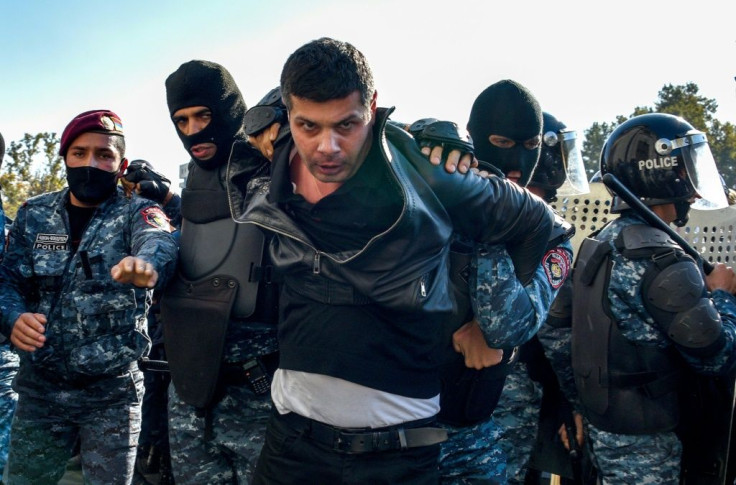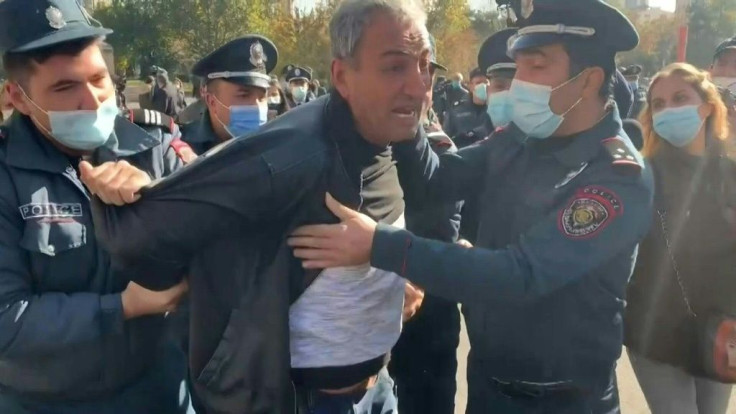Yerevan Reels From Defeat In Nagorno-Karabakh
On Yerevan's emblematic Republic Square, a giant screen continuously broadcasting videos to the glory of Armenian soldiers fighting in Nagorno-Karabakh has been quickly, quietly removed.
The announcement early Tuesday of a peace deal that cedes swathes of the disputed region to Azerbaijan has traumatised Armenians.
Shock at the news has made way for a mix of incomprehension, despair, helplessness and rage.
"Armenians are broken, still standing but knocked out," says Jenny, a student who has been deeply affected by the loss of territory in Nagorno-Karabakh, a region of Azerbaijan seized by ethnic Armenian separatists in a 1990s war.
"We lost. And what happened is much worse than a mere military defeat."
"It's our history, our culture, our soul that we're losing. Not to mention the useless sacrifice of thousands of our men, killed or injured," adds Jenny, who says she would like "to wake up from this bad dream."

For Teni Vardanyan, an artist, "what happened is a terrible catastrophe and couldn't have been imagined even in our worst nightmares."
Prime Minister Nikol Pashinyan has repeatedly justified a decision he describes as "unspeakably painful" by saying there was no choice, with even the army asking for the end of hostilities as Armenia faced a crushing defeat.
But anger has spilled over onto the streets.
In the early hours of Tuesday morning, several hundred protesters stormed the government building and parliament, calling Pashinyan a "traitor."
And several thousand demonstrated in Yerevan on Wednesday.
For the most part, though, most are just stunned.
"We've all been hit in the heart," says Arman, a journalist, describing the initial disbelief felt by his loved ones, followed by despair.
Every family in Yerevan has a brother, cousin or friend on the front line.
The subject is at the heart of all conversations in a fiercely patriotic country with a tumultuous history that includes the mass killings of Armenians in the Ottoman Empire during World War I.

Over the last few weeks, people had been receiving a constant drip-drip of alarming news on their phones, such as daily death tolls or videos of Azerbaijani drones that destroyed armoured vehicles and killed soldiers in the trenches.
The fall of the symbolic and strategic town of Shusha, the second-largest in Karabakh, precipitated the end.
The atmosphere that reigned at the start of the war over six weeks ago is long gone.
At the time, volunteers lined up to enlist and go to the front, others collected money and clothes, people gathered to sing to the glory of "Artsakh," as Nagorno-Karabakh is known in Armenian, and the army released victorious statements.
Now, all that is left are flags still hanging from windows and street lamps.
Jenny recognises that Pashinyan did not have much choice.
"He saved lives and what we could still save in Karabakh," she says, a view widely shared among residents in Yerevan.
She also points out that Russia, an ally of Armenia, brokered the ceasefire.
But the agreement itself is a source of concern.
What will happen to the monasteries in the mountainous region?
How will Armenians live in peace with the Azerbaijani army not far away in Nagorno-Karabakh?
"With an opponent other than Azerbaijan, we might have believed in peace. But we don't trust them," says a soldier, who wishes to remain anonymous.
There is resentment towards the international community, too.
"The world didn't do anything for us, just talk," says one woman.
"Once again, history has shown that we're alone, hopelessly alone in the face of our enemies."
© Copyright AFP 2024. All rights reserved.


















